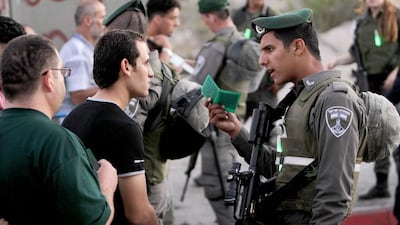Behind the headline news of clashes between Palestinian youths and armed Israeli soldiers, Israel has – as ever – been quietly tightening its grip on Palestinians’ lives in the occupied territories.
Last week in Hebron, 50 embattled families still living in the Tel Rumeida neighbourhood faced a new restriction on movement designed to help free up the area for intensified Jewish settlement. Some residents could be seen silently queuing at the local checkpoint to register their ID cards. Anyone not from the neighbourhood and not on the military’s list will be barred from entering.
Their response differed starkly from the reaction 21 years ago, when residents faced a similar order. Then, the entire neighbourhood refused to register. Israel punished them with a curfew for six months, allowing the families out for a few hours a week to buy food.
How to respond to military orders of this kind stands at the heart of a debate reviving among Palestinians about the relative merits of armed struggle and non-violent resistance.
A poll in the early summer showed 49 per cent of Palestinians between the ages of 18 and 22 supported an armed uprising. By September, after the first clashes in Jerusalem, that figure had surged to 67 per cent.
The volatility can in part be explained by an inevitable thirst for revenge as Palestinians watch compatriots being killed or maimed by Israeli soldiers.
But it also reflects a void of Palestinian strategy. Instead, Palestinians have been buffeted into polarised camps that, put simply, pit Hamas’s rhetoric of armed struggle against the stalled diplomacy of Mahmoud Abbas and his Palestinian Authority. Non-violence once earnt a central place in Palestinian resistance to occupation. During the first intifada of the late 1980s, Palestinians engaged in mass civil disobedience: they refused to cooperate with the military authorities, burnt their ID cards, refused to pay taxes and held strikes.
That approach never entirely ended. Today it finds expression in the weekly protests by villages against Israel’s steel and concrete barrier eating away at Palestinians’ agricultural lands. These protests remain largely peaceful.
But the use of non-violence has been limited to local struggles, waged with the aim of small victories. It has also invariably coexisted with more violent approaches, from stone-throwing to the current knife attacks.
Much of the blame falls to Mr Abbas, who has appropriated the language of non-violence while failing to harness it to a national strategy of resistance. Even the PA’s support for the villagers’ battles against Israel’s separation barrier has been half-hearted.
In the minds of many Palestinians, non-violence has become tainted by association with Mr Abbas’s years of ineffectiveness: his desperate attempts both to push Israel into peace talks and to cosy up to Washington. The nadir was his declaration of the “sacred” status of the PA’s security coordination with Israel.
Nonetheless, some Palestinian intellectuals are advocating non-violent resistance as they warn against an armed uprising. Palestinians have a right in international law to resist the occupation, even violently, but this group emphasises the futility of violence faced with Israel’s military superiority.
In an article headlined “Don’t go out to die, Palestine needs you alive”, journalist Mohammed Daraghmeh called on Palestinians to “channel the national anger toward mass protest”. Reminding Palestinians that the western world created the conflict and must fix it, Mr Daraghmeh warned: “It will not do so if we commit suicide.”
Similarly, Palestinian businessman Sam Bahour has coined the term “smart resistance”, arguing that all the Palestinian factions should commit to non-violent resistance.
Both have drawn on earlier strategies of communal solidarity and collective sacrifice – as demonstrated by Tel Rumeida’s inhabitants two decades ago.
One of the architects of the first intifada’s non-violent resistance, Mubarak Awad, recently reminded Palestinians that it is no soft option. “It’s about using non-violence militantly, like a kind of unarmed warfare,” he told an interviewer.
He suggests instead refusing to carry Israeli-issued IDs, defying curfews, blocking roads, planting trees on sites intended for settlement, tearing down fences, staging sit-ins and inviting mass arrests to fill to breaking point Israel’s jails.
Such actions require mass participation, mobilising women, children and the elderly – the very groups likely to be excluded from armed struggle.
And, as Mr Awad notes, non-violence also needs people to be trained in its principles. That is why he has translated into Arabic the teachings of Mahatma Gandhi and Martin Luther King.
The power of disciplined non-violent resistance, he adds, is that it forces on the occupier a heavy burden: to “deal with our willingness to stand up for ourselves with nothing but our bodies and hearts”.
It also forces Israelis to “choose what kind of people they are”, and creates division and dissent among the oppressor population, weakening its resolve.
It is a challenging message, especially when Israel is so ruthlessly crushing Palestinian hope and dignity. But Mr Awad argues that it is precisely by demonstrating an irrepressible humanity that Palestinians can again discover hope, reclaim their dignity and win freedom.
Jonathan Cook is an independent journalist in Nazareth
On Twitter: @jonathan_k_cook


